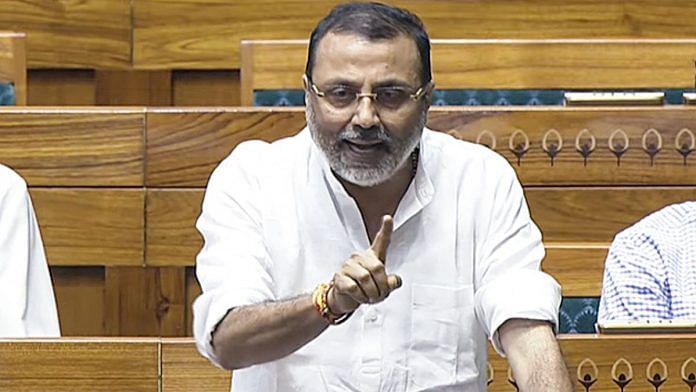A career-defining moment
Nishikant Dubey’s blistering attack on the Supreme Court and Chief Justice of India Sanjiv Khanna is probably a career-defining moment for him. Especially so because BJP president JP Nadda chose to issue a statement, distancing the party from the Godda MP’s remarks.
Dubey has every reason to be happy about it, though. Such distancing by the BJP is, more often than not, followed up with rewards. Remember Giriraj Singh’s April 2014 remarks asking people to back Modi or go to Pakistan? He was made a minister of state just a few months later. Singh hit the headlines again in 2015, when he asked whether the Congress would have accepted the leadership of Rajiv Gandhi’s wife had he married “a Nigerian lady and not a white-skinned woman” like Sonia Gandhi.
Many, including the Nigerian envoy in New Delhi, took exception to this. The BJP distanced itself from Singh again. But, a couple of years later, he was elevated as a minister with independent charge. Singh, who never stopped with his controversial and communally polarising remarks, was made a full-fledged Cabinet minister in 2019. He continues to make headlines with controversial statements, even though most people may not even remember the name of the textiles minister.
Look at another case—of Nitesh Rane, former Union minister Narayan Rane’s legislator son. In September 2024, Nitesh, a BJP MLA, threatened to enter a mosque and hit Muslims “one by one”. The BJP distanced itself from him, saying that such remarks have no place in public life.
About three months later, he was a Cabinet minister in the Devendra Fadnavis-led government.
There is a long list of BJP leaders who the party distanced itself from after controversial statements, only to reward them later. Nishikant Dubey has finally joined this coveted list.
What do you think was Nadda’s message to Dubey? Check out the latter’s X handle. Dubey hasn’t deleted the ANI video clips where he is making a no-holds-barred attack on the CJI and the Supreme Court. In fact, hours after Nadda’s message, Dubey opened a new front, stating that former chief election commissioner SY Quraishi was “Muslim ayukt” and not “chunaav ayukt” (Muslim commissioner, not election commissioner). Don’t be mistaken. The Godda MP won’t do anything against the wishes of the party high command. The message that he got from Nadda’s statement was obviously different from what people made of it.
A BJP leader attacking the judiciary shouldn’t come as a surprise. Remember Arun Jaitley saying that Indian democracy cannot be “a tyranny of the unelected?” That was after the Supreme Court had struck down the National Judicial Appointments Commission (NJAC).
Many of his colleagues, including then-law minister Ravi Shankar Prasad, attacked the Supreme Court over the collegium system.
So, Nishikant Dubey is only following in the footsteps of his more illustrious party colleagues. Just that he took it a bit too far by holding CJI Khanna responsible for “civil wars” in the country.
Also read: Tharoor is a misfit in Rahul’s Congress. Why outspoken leaders are on margins in all parties
Keeping up with global trends
There is nothing unique about a powerful, dominant ruling party attacking the judiciary. It’s in keeping with the global trend. Look at how the Army-backed government in Pakistan is trying to disempower the judiciary. The Pakistani Parliament has passed a law that virtually empowers the Prime Minister to select the CJP.
And see how the Donald Trump administration has been attacking the judges and the judiciary for thwarting his plans.
Check this headline in The Guardian — “Trump’s defiance of court orders is testing the fences of the rule of law.” American publications are full of them.
Turkish president Recep Tayyip Erdogan continues to attack the judiciary even though the latter has been playing along, allegedly enabling him to arrest his political challengers. That’s even after he “purged” 4,000 judges between 2016 and 2019.
In Italy, Prime Minister Giorgia Meloni has been on a warpath against judges and prosecutors. There is a similar trend in Viktor Orban’s Hungary, Donald Tusk’s Poland, etc. These are all countries ruled by powerful and popular heads of governments who are clear that the political executives must reign supreme, unencumbered by any institution – judiciary or whatever else.
The Supreme People’s Court of China may be a fine model for them as it is okay with being subservient to the Communist Party of China. In 2017, the country’s top judge, Chief Justice Zhou Qiang, warned against judicial independence, asking China’s courts to resist “Western ideas” that threaten the CPC leadership.
“People’s courts at all levels must disregard erroneous Western notions, including constitutional democracy and separation of powers”, Zhou Qiang said at the Supreme People’s Court meeting in 2017. Nothing has changed since then.
Back home, why is Nishikant Dubey so upset with the Supreme Court? Why does he think CJI Sanjiv Khanna is “responsible” for “civil wars”? The fact is that Dubey may have his personal opinion about the judiciary but he is not venting out his individual grouse. Hear him attentively. He is questioning court rulings with long-term implications for the BJP’s politics. To start with, Justice Khanna is leading the bench on the Waqf Act that raised some probing questions on many crucial provisions of the amended legislation. Last December, a CJI-led bench barred courts across the country from passing any effective orders or surveys against any existing religious structures.
Look at the other points of Dubey’s criticism: Who is the Supreme Court to set a three-month timeframe for the Governor or the President of India to decide on a bill passed by state legislatures? That an overwhelming majority—if not all—of these long-pending bills were from non-NDA ruled states is not a coincidence. One could always question why the president or a governor should have an issue with a timeframe to decide on bills. Whether the highest court of the land has the powers to set a timeframe for the President of India is a debatable issue.
Dubey’s other grouse against the Supreme Court is the scrapping of Section 377 of the IPC, which criminalised homosexuality. Even the RSS was in agreement with the court order. RSS chief Mohan Bhagwat had said that the LGBTQIA+ community was “very much a part” of society.
The issues raised by Nishikant Dubey and the merits of his arguments aren’t material in the larger context. The fact is that he is only voicing his party’s concerns, notwithstanding Nadda’s public statement. The Opposition sees it as an attempt to browbeat the highest judiciary that’s largely ensured institutional checks and balances. Though the Congress also doesn’t have a stellar record when it comes to undermining the judiciary.
As argued above, it’s not unusual for a dominant ruling party to wish for a committed judiciary. Nor is this phenomenon limited to India. My lords also need to think about what gives parliamentarians the courage to take them on.
Remember the Supreme Court’s insistence on making the electoral bonds data public? The court got thumping applause for taking on the government. What happened at the end? Parties, especially those ruling at the Centre and in states, had the last laugh.
There were so many instances of companies and individuals giving hundreds of crores to parties and getting favourable treatment later. The SC could have ordered a court-monitored inquiry into possible quid pro quo for those bonds. The court, however, chose to leave it to public imagination. Look at the way the political executive made a mockery of the SC ruling to make the Election Commission autonomous. It’s the PM who is virtually handpicking the election commissioners. The petitions challenging the law that virtually overturned the SC ruling on this have been pending in the meantime.
There are so many other crucial issues in which the SC has shown no urgency to decide. They are stuck in the familiar tarikh-pe-tarikh (date after date) cycle. My lords can’t fault the politicians if the latter see in such procrastination signs of vacillations, diffidence, and even reluctance to take on the powerful executive.
DK Singh is Political Editor at ThePrint. He tweets @dksingh73. Views are personal.
(Edited by Zoya Bhatti)
var ytflag = 0;
var myListener = function() {
document.removeEventListener(‘mousemove’, myListener, false);
lazyloadmyframes();
};
document.addEventListener(‘mousemove’, myListener, false);
window.addEventListener(‘scroll’, function() {
if (ytflag == 0) {
lazyloadmyframes();
ytflag = 1;
}
});
function lazyloadmyframes() {
var ytv = document.getElementsByClassName(“klazyiframe”);
for (var i = 0; i < ytv.length; i++) {
ytv[i].src = ytv[i].getAttribute('data-src');
}
}








